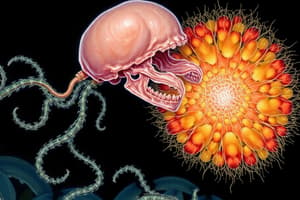Podcast
Questions and Answers
Which term refers to the manner in which a disease develops?
Which term refers to the manner in which a disease develops?
- Microbiota
- Pathogenesis (correct)
- Pathogen
- Pathogenicity
What is the concept that describes the relationship between normal microbiota and host?
What is the concept that describes the relationship between normal microbiota and host?
- Normal infection (correct)
- Pathogenicity
- Pathogenesis
- Koch’s postulates
Which term refers to the ability of an infectious agent to cause disease?
Which term refers to the ability of an infectious agent to cause disease?
- Pathogenicity (correct)
- Pathogen
- Pathogenesis
- Microbiota
What is the term for a microorganism that is able to cause disease in a plant, animal, or insect?
What is the term for a microorganism that is able to cause disease in a plant, animal, or insect?
Which book provides information on Pharmaceutical Microbiology?
Which book provides information on Pharmaceutical Microbiology?
What is the measure of the extent to which an organism can inflict disease?
What is the measure of the extent to which an organism can inflict disease?
Which term refers to the process whereby organisms enter host cell or tissue and spread in the body?
Which term refers to the process whereby organisms enter host cell or tissue and spread in the body?
What is the measure of the dose of an agent that kills 50% of the animals in a test group?
What is the measure of the dose of an agent that kills 50% of the animals in a test group?
What is the number of pathogenic microbes entering a host called?
What is the number of pathogenic microbes entering a host called?
Which term refers to the ability to breach host defenses?
Which term refers to the ability to breach host defenses?
What is the term for a usually harmless microorganism that becomes pathogenic under favorable conditions?
What is the term for a usually harmless microorganism that becomes pathogenic under favorable conditions?
Which term refers to the ability to produce a toxin that contributes to the development of disease?
Which term refers to the ability to produce a toxin that contributes to the development of disease?
What is the number of microorganisms which kill 50% of host tissue cells (or 50% of animals in a test group) called?
What is the number of microorganisms which kill 50% of host tissue cells (or 50% of animals in a test group) called?
Flashcards are hidden until you start studying
Study Notes
Disease Development and Microbiology
- Pathogenesis refers to the manner in which a disease develops.
Microbiota and Host Relationship
- Symbiosis describes the relationship between normal microbiota and host.
Infectious Agent Characteristics
- Virulence refers to the ability of an infectious agent to cause disease.
- Pathogen is a term for a microorganism that is able to cause disease in a plant, animal, or insect.
Pharmaceutical Microbiology Resource
- The book "Pharmaceutical Microbiology" provides information on pharmaceutical microbiology.
Disease Severity and Microbial Infection
- Virulence is the measure of the extent to which an organism can inflict disease.
- Inoculum is the number of pathogenic microbes entering a host.
- Invasiveness refers to the ability to breach host defenses.
Microbial Toxins and Infection
- Toxigenicity refers to the ability to produce a toxin that contributes to the development of disease.
- Opportunistic pathogen is a usually harmless microorganism that becomes pathogenic under favorable conditions.
Infection and Toxicity Measures
- LD50 (Lethal Dose 50) is the measure of the dose of an agent that kills 50% of the animals in a test group.
- ID50 (Infective Dose 50) is the number of microorganisms which kill 50% of host tissue cells (or 50% of animals in a test group).
Studying That Suits You
Use AI to generate personalized quizzes and flashcards to suit your learning preferences.




